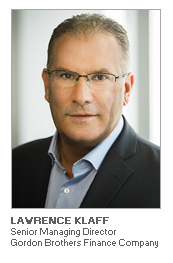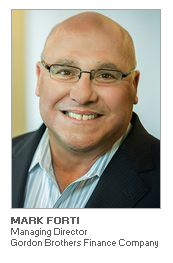
Baseball legend Yogi Berra once said of his New York Yankees team, “We have deep depth.” While Berra wasn’t referring to the commercial finance industry, this quote captures the spirit and mission of Gordon Brothers Finance Company (GBFC) – a private asset-based provider of loans to middle-market companies. Over the past two-plus years, this unique commercial finance company has successfully financed businesses in the U.S. and beyond – expanding its operations throughout North America and into Western Europe and Australia. Building and operating commercial finance businesses overseas can be challenging, as many banks and finance companies can attest; however, GBFC has found a way to successfully navigate its way around the globe.
To learn more about how GBFC is achieving this global growth, ABL Advisor sat with Larry Klaff, Senior Managing Director, and Mark Forti, Managing Director, who explain their views of the middle-market lending environment both in the U.S. and internationally, while also sharing their strategy behind conducting business abroad.
ABL Advisor: Numerous financing sources, including private equity firms, have become active in what is often described as “the under-served middle market." With so many new entrants into this market segment, what sectors does GBFC believe will provide the greatest opportunities -- both domestically and globally -- for earning asset growth over the next two to five years?
Mark Forti: We see a lot of activity in the retail sector and this is a natural fit for us given our team’s experience. We are going to continue to see stress in the retail space throughout North America, including Canada, as well as overseas. I also believe we will be seeing a lot of activity in the oil and gas, and metals and mining sectors throughout the U.S. and overseas. We had been cautious about dipping our toe into oil and gas or mining - at least domestically - but we are starting to feel it may be the right time to enter those sectors as we anticipate seeing an uptick in new deals.

Larry Klaff:I think the middle-market is being served nicely – in fact, I would argue that the middle-market is now overserved. However, it’s important to establish how one defines the middle market. If you talk with a money-center bank, its definition of the middle market is dramatically larger than a specialty finance company’s definition of the middle market. I think Mark’s right -- the oil and gas industry has certainly opened up, and finance sources are getting a little more comfortable with these types of companies. The market has seen a significant number of casualties in oil and gas, so the survivors have either been able to withstand the environment because they have found a niche, or there’s been a consolidation within the market. As a result we’re getting more comfortable with the space. This comfort is also being driven by auction results, as there’s more predictability in equipment values – a driver of GBFC’s interest in the market. We had very little exposure during the crisis in oil and gas because we saw the softness in the asset values, which tempered our interest in this space.
As retailers continue to shed stores, we’ve seen an increase in investment in online retailers. More recently, intellectual property is becoming another asset class that senior lenders are lending against. We were early adopters of IP/brand lending and have been doing this form of lending with big names in Europe and in the U.S. for many years. Today it’s become more commonplace to see brands being added to a borrowing base.
ABL Advisor: How would you describe the competitive landscape in the segments of the middle market covered by GBFC? Do you foresee significant changes over the next 18-24 months considering we are in a rising rate environment?

Klaff: Overseas, we have active deals in five different countries including Denmark, Switzerland, Germany, the U.K. and Australia. Every jurisdiction has its own nuances and every country has its own marketplace. For example, the U.K. marketplace is very competitive at this time. This is in direct correlation to specialty finance companies and U.S. banks pursuing the U.K. marketplace. The European market is trying to figure out the whole Brexit situation - not that they are worried about doing cross-border business - but rather the impact and cost for the companies conducting cross-border business. One key question is how banks and finance companies will deal with insolvency and cross-border situations going forward.
Forti: I don’t think we will see a dramatic change in the competitive landscape as rates rise because we lend on assets that lenders are typically not comfortable with, or else are limited in the amount they can advance against. This differentiates us from those lending sources. There are plenty of private finance companies that are funded the same way GBFC is funded and we compete with them daily; but we believe we bring a great deal more flexibility to the table based on our deeper knowledge of values in various asset classes, and the speed at which we can execute a transaction. Our primary client base is the national banks with asset-based lending shops across the U.S. and globally. We typically partner with them to provide an enhanced liquidity solution to the borrower, which they may not be able to provide due to leveraged-lending guidelines, or their own internal credit policies.
Klaff: Again, for us it is all about the assets. We expect our average loan to be in the $10-100 million range with an average loan term of roughly 20 months. Ultimately, however it is the senior banks that become our exit strategy, because even though we are brought in as a partner initially to fill the gap, many times we are refinanced by the senior lender when they get more comfortable with the credit.
ABL Advisor: According to recent data from Thomson Reuters, lenders are finding it less appealing to join together in unitranche deals as falling yields coupled with larger deal sizes have dampened returns. How would you describe current demand for FILO and unitranche deals in the middle market both in the U.S. and internationally?
Forti: Most of the shops that we interact with are pulling away from unitranche transactions. This creates opportunities for us because some form of finance needs to fill these capital requirements. Today we see senior asset-based lenders providing classic asset-based revolvers and perhaps some form of a small stretch piece. They also offer the FILO tranche or a tranche B with either a first or second lien on the assets. So we have seen a change in this market.
Klaff: I agree with Mark in regards to the state of the unitranche market. The biggest difference between GBFC and unitranche lenders is that GBFC will underwrite a covenant light deal – providing the borrower more flexibility in borrowing capacity. A unitranche lender looks much more at the more common metrics of leverage, with less focus on the borrowing base because they’re not looking at the assets as a source of recovery on the downside.
ABL Advisor: Why has GBFC entered the Australian market – what makes Australia so attractive?
Klaff: First and foremost, Australia is attractive because its laws closely mirror U.K. laws, which we are well versed in. Lending on assets in countries where there is predictability with regard to how bankruptcy courts are going to react to insolvency makes lending much easier compared to lending in countries such as France, Italy or Spain – where the insolvency practices and how liens are viewed can lead to very different outcomes. GBFC is an independent financial firm that maintains a relationship with Gordon Brothers, which has deep valuation and disposition expertise. So when it comes to entering new markets, it’s helpful to think of Gordon Brothers as the horse and GBFC as the cart. Gordon Brothers enters markets in Europe and other markets were they can get comfortable with the liquidation process. Once they’ve done this successfully a few times, GBFC gets more comfortable underwriting deals – this is how we started lending in Denmark and figuring out the nuances in Germany. Australia is exactly the same – we’ve had successful liquidation experience in Australia and we’ve seen the process work in the court system. But we won’t start conducting business in a country where Gordon Brothers hasn’t already conducted successful liquidations.
Forti: I echo Larry’s comments and will add that over the years, many shops have tried to establish lending operations in Australia, but few have succeeded in getting these operations off the ground. The prevailing industries in Australia include metals, mining, oil and gas. These are asset-intense industries that are attractive to us. We are confident that we possess enough knowledge with our experience in the U.K. and Europe to make our efforts in Australia successful.
ABL Advisor: What is your outlook for middle-market lending in the U.S. as we enter the second half of 2017?
Klaff: We are having a good year in terms of assets under management and we are anticipating a strong second half in 2017. Typically in the retail and consumer world, the summer is quieter, but that has not been the pattern in 2017. We see that momentum continuing into the rest of the year. Also, globally, oil and gas continues to be very active for us and we anticipate these sectors to be very active in the future. One area where we expect to see new opportunities is the nautical shipping industry. The shipping industry has gone through significant challenges, and we are seeing new opportunities to deploy capital. Whether we do so or not is yet to be determined.
Forti: At this point in 2017, we’re seeing more activity in the middle market than normal, which we anticipate this will continue well into 2018. This is an exciting time to be lending in the middle-market.